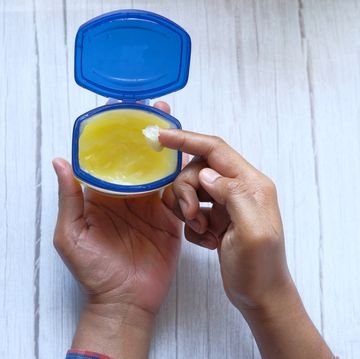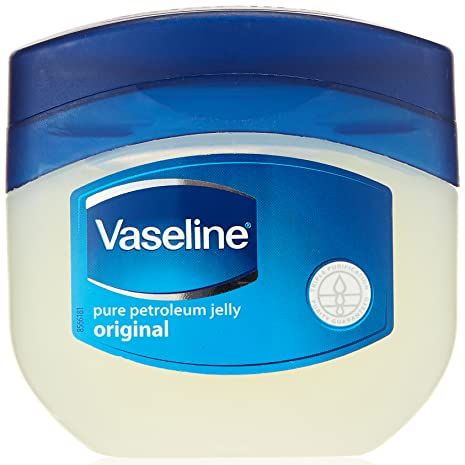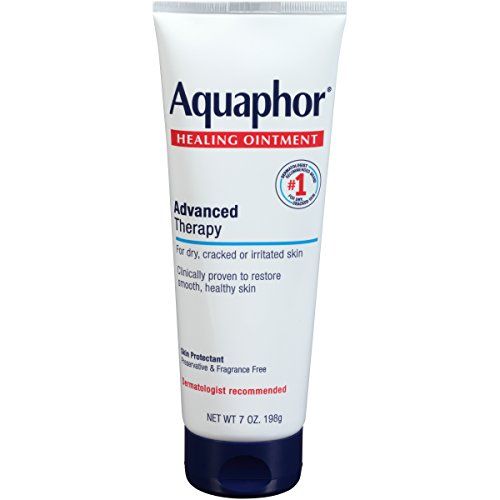
We’ve all tried something in the name of self-improvement. Whether it’s a shimmery new blush or something more daring—remember the lettuce water trend, anyone?—the majority of us have ventured to try a beauty trend at least once. This past year, a new South Korean beauty trend made its way West: slugging (don’t worry, it doesn’t involve any slugs). And it turns out, it just might be what your skin has been missing.
While TikTok may have highlighted the benefits of slugging, the idea behind it has been around for a while. “Slugging is actually nothing new, we just didn’t have a cute name for it,” says Chloe Savvides, licensed medical aesthetician at Paviol Dermatology. “We can take this ‘trend’ back to our grannies and great-grannies with their self-taught skincare techniques for hydration. We can think of slugging as the OG anti-aging moisturizer.”
Savvides explains how her grandmother used to slather her face in a heavy cream each night, prompting people to compliment her on how soft her skin was. “This was what we now consider slugging.” While social media may have given new life (and a new name) to the old trend, it’s definitely not something everyone should be doing.
Ahead, experts discuss what slugging is, who would benefit from it, and who should avoid it at all costs.
What is slugging?
Slugging is a K- Beauty trend that originated in South Korea, according to Savvides. It involves coating your face in an occlusive petrolatum product (most commonly, Vaseline) to “trap in” moisture and prevent trans epidermal water loss, a top contributor to dry skin. “To understand ‘the slug,’ we must understand what it is meant to do,” she explains, adding that the use of an occlusive barrier like Vaseline for protecting against moisture loss is only effective when someone is suffering from extremely dry skin or an otherwise compromised barrier on their face. So, in summary, slugging is just slathering your skin with petroleum jelly. The term stems from the concept that after you apply the petroleum jelly, your face ends up looking shiny and slimy, like what a slug would leave in its wake.

Vaseline Blueseal Pure Petroleum Jelly Original

Baseline-16605 Swan 100% Pure Petroleum Jelly

Aquaphor Healing Ointment
Advertisement – Continue Reading Below
Who benefits from slugging?
Are you suffering from Eczema? Psoriasis? Wind-chapped cheeks? Then Savvides says slugging may be a good idea in the interim, since it’s more of a temporary fix for minor problems. “When we think of slugging as a ‘reparative’ means to the skin, we slug more than we think,” she says, explaining how her patients often get “slugged up” after micro-needling or chemical peels. “I coat their face in a healing ointment to ‘repair’ their skin after an aggressive procedure. This is the same as if your mother has ever told you to put Vaseline/Aquaphor on chapped lips or a burn.”
If you have compromised skin, like from one of the issues she mentioned before, Savvides says a thin layer of Vaseline or Aquaphor can be a great option for healing your skin.
RELATED STORY
Who should avoid slugging?
While Marie Hayag M.D., Board Certified Dermatologist and Founder of 5th Avenue Aesthetics believes people with more mature skin or those who suffer from facial dryness can benefit from the technique, she doesn’t think it’s for everyone. “I don’t think slugging is suitable for anyone with acne-prone skin,” she says. “Although petrolatum jelly is non-comedogenic, it’s too occlusive for acne-prone skin and can trap dead skin cells and other debris, which encourages bacterial overgrowth and acne breakouts.”
Should you add slugging to your skincare routine?
Savvides says she tells all her patients that the goal of any good skincare routine is a proper balance between exfoliation and hydration. “To exfoliate and not properly hydrate, can cause problems down the road with an overproduction of oil on the skin to compensate for the moisture that was lost during exfoliation,” she says. “Even so when skin is hydrated constantly without being properly exfoliated, it can lead to dull and sometimes even congested skin.”
Balance is key. So, if you’ve caught the “slug bug,” Savvides says you should only slug when it makes sense. “This is why it is so important to consult with an aesthetician or skincare team to collaborate on a routine that is going to work for you. Understanding the proper exfoliation and hydration balance is different for everyone,” she says. “In the short term, is slugging going to make your skin feel uber soft? Absolutely, but we should be thinking long-term results in our skincare routine… because that’s what helps us to stay motivated to actually stick to it. Slugging is not for everyone. However, a properly balanced skincare routine is.”
Is slugging a fad or here to stay?
According to Debra Jaliman, M.D, a board-certified dermatologist in NYC, Assistant Professor of Dermatology Icahn School of Medicine at Mount Sinai, and author of the book, Skin Rules: Trade Secrets from a Top New York Dermatologist, slugging might just be another skincare fad. Instead, she suggests sticking with what the experts already know works. “I recommend sealing your skin with a highly hydrating cream containing ceramides and hyaluronic acid instead.”

Neutrogena Hydro Boost Hyaluronic Acid Serum
Now 33% Off

Dr. Dennis Gross Hyaluronic Marine Hydration Booster

Vichy Minéral 89 Daily Skin Booster Serum and Moisturizer

Peter Thomas Roth Water Drench Hyaluronic Cloud Serum
Savvides also suggests opting for non-petrolatum-based products. “Why not a super hydrating face mask? Or a hydrating facial balm? The idea is to lock in moisture overnight,” she says.